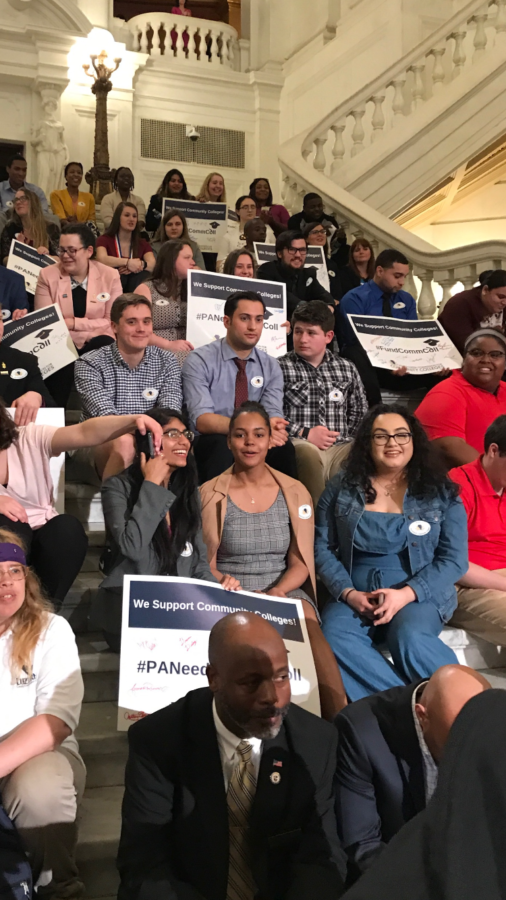Students and faculty members from Bucks traveled to the Pennsylvania Commission for Community College’s (PCCC) Annual Lobby Day in Harrisburg on Monday, April 9 in order to promote the idea that community colleges in Pennsylvania should receive more funding from the state.
As of right now, Pennsylvania’s budget proposed by governor Tom Wolf is not increasing the amount of funding towards community colleges since last year, which amounts to $239 million according to an article written by the Pennsylvania Capital-Star.
Attendees had the chance to meet with the dozens of PA representatives and talk to them about why they feel that community colleges are important to the population of Pennsylvanians that are seeking secondary education.
PA representatives in attendance included Steve Santasiero, Bob Mensch, Frank Farry, and many more. Students were encouraged to meet in groups with representatives from their own townships in order to more efficiently advocate for more state funding for Bucks and other community colleges.
Jasmine Ramos, a 20-year-old early childhood education major from Hackensack, NJ shares that she really felt like her voice was heard when she attended the conference. “It was cool to be able to speak to my own representative, Wendy Ullman, who was very helpful. Representatives were also giving out business cards and letting students know that they have connections at multiple PA colleges if students ever need help.”
The president of Bucks, Stephanie Shanblatt, spoke at this event as she is also a chairwoman for the PCCC. She argued that more funding from the state “…will support the colleges’ vital role in providing high-quality education and workforce training” according to the PCCC’s newsroom.
President Shanblatt was accompanied by English professor John Strauss, director of Student Life Matt Cipriano, and music professor John Sheridan to help organize students and get other staff involved in the event. Sheridan said he had been involved with Lobby Day for about 10 years and helped students break into teams in order to connect with their own local representatives.
He says this cause is dear to his heart because he is a Bucks alumni and knows what it’s like to attend the school.
“I had to be convinced by my mom to go to college, and figured I’d start out at community college because of how much cheaper it was. After majoring in music, I was able to go on to Temple University and even New York University to get my Masters degree. So, I am very thankful for the opportunity Bucks has given me to bring me where I am today,” said Sheridan.
Sheridan also relates the proposition of increased state funding to the recent tuition increase that goes into effect next semester.
“As the price of maintaining college resources increases, the state is not in turn increasing the amount of money the college receives. It’s up to the students to supply this by paying more money for tuition,” said Sheridan.
Tuition, after all, is a big reason why so many Bucks students are getting involved and attending events like these.
Ramos, who is also a member of Student Government Association (SGA), shared that increased state funding is important to her because of how much Bucks helped her out financially.
“I came from a low-income family and wasn’t even sure that I’d go to college. That’s why I’m so glad that Bucks was an option for me to be able to have such an amazing education for such a cheaper price,” said Ramos.
19-year-old Sylvia Salas, also a member of SGA who attended Lobby Day and a psychology major from Levittown shared that as a first-generation college student, she is grateful that Bucks was always an option for her for the same reason as Ramos.
It is said that by going to a community college, students can save up to $20,000 in debt.
Overall, many deem this year’s Lobby Day as a success.
Sheridan added, “Many representatives understand what a gem Bucks is. Many have roots in Bucks County and have gone to the college and understand what a difference Bucks makes to the state of Pennsylvania.”
It is Sheridan’s, as well as many others’ hopes that events like these will encourage more students to contact their local government officials in order to make a substantial change in state legislation that matters to them.


